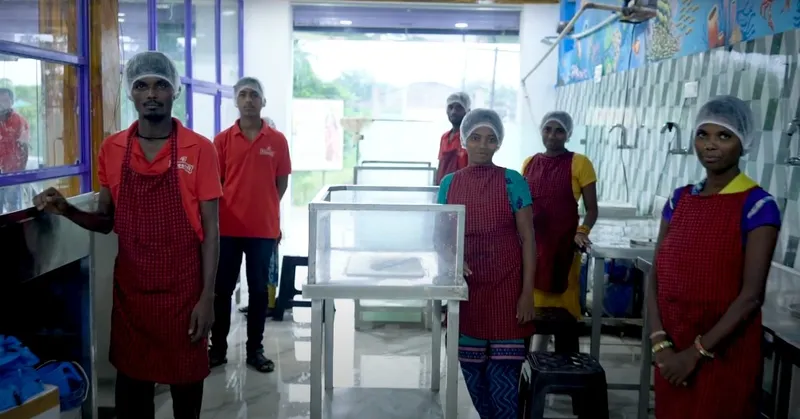How the founders of FreshR found an opportunity in the highly unorganised B2B fish and meat industry
Ambika Satapathy co-founded B2B-focused meat and seafood delivery startup FreshR with her husband Sadanand Satapathy in 2016. In June, the startup raised $1.2 million in a seed round led by Axilor Ventures and 1crowd.
Much has been said and written about how the pandemic outbreak in 2020 was a boon of sorts for online direct-to-customer (D2C) meat delivery startups in India.
According to a report by research group RedSeer, Indian shoppers increasingly took to buying meat online “driven by the assurance of safety and hygiene, availability of various products under one umbrella, and doorstep service provided by online meat providers”.
While retail consumers turned to online meat delivery, businesses were not far behind in discovering the advantages of an organised meat market. Realising this first hand was Ambika Satapathy, the Co-founder and CEO of Delhi-headquartered , a B2B marketplace for fish and meat in India.
In a chat with YourStory, she talks about how FreshR plans to reimagine the traditionally unorganised sector by digitising the value chain, and building an infrastructure for fulfilment whilst improving farmer incomes and creating a seamless user experience for B2B buyers.
FreshR was founded by Ambika and her husband Sadanand Satapathy, a former Ministry of Defence employee who was part of the team that inspected supplies to the defence forces.
“Ours is a farm-to-fork journey, so to speak. When we started out, we set up our own poultry farms in Orissa and eventually realised how massive and unorganised the meat industry was, especially post-production, the supply chain, and distribution. There was absolutely no modernisation and many large players were simply trying to consolidate the post-harvest supply chain,” Ambika recalls.
She says Sadanand’s work with the MoD gave him good exposure to manufacturing best practices, and was instrumental in him wanting to set up something of his own.
In 2019, sitting out of Bhubaneshwar, Orissa, Sadanand’s hometown, the couple registered FreshR as a private limited company, raised a pre-seed round from a bunch of impact investors and Bharat Petroleum’s startup fund, and diversified their product portfolio into fish, chicken, and mutton products.
The company’s target areas are Orissa, Jharkhand, Chattisgarh, Andhra Pradesh, Bihar, and West Bengal.
“The idea was to buy high-quality produce from source, and supply it to high-value markets. These areas are production zones where we can yield very great products at a competitive price. We now have distribution in cities across eastern North India, and we are also setting up a processing and distribution centre in Delhi-NCR,” Ambika says.

Ambika and Sadanand Satapathy went from owning chicken farms in Orissa to running a successful B2B meat and seafood business.
B2B fruits marketplace startup Vegrow raises $25M in Series B from Prosus Ventures, others
Finding order in the chaos
According to The Economic Survey 2021-22, meat production in India has increased from 6.69 million tonnes in 2014-15 to 8.80 million tonnes in 2020-21 (provisional).
Despite being a vital part of the agricultural setup and massive growth, meat producers and distributors across India have been known to be shirkers of digital practices, preferring to rely on traditional sales networks and legacy customers.
This is where firms like FreshR can hope to make a difference.
FreshR’s one-stop platform ensures its customer base of wholesalers, traders, and distributors in the general trade segment, and the HORECA segment (hotels, restaurants, caterers, and institutional buyers) now do not have to deal with multiple vendors for chicken, fish, mutton, and other meat products.
Ambika says having a level of integration beyond just owning farms and farmer networks to having control over product quality and last-mile distribution also made FreshR significantly price-competitive.
“We’re able to supply superior quality products and add a layer of convenience and technology into the entire fulfilment system,” she says, explaining that the app for B2B customers enables them to see the entire inventory, and place bulk orders to ensure deliveries in the cities where they are active. This includes towns like Ranchi, Dhanbad, and parts of Orissa, besides Delhi-NCR.
Apart from the supply, the meat processing segment has other challenges. Dealing with a highly perishable commodity warrants a high level of organisation and technology, which Ambika says FreshR has been actively focused on.
“We have invested in the supply chain, have built the technology around it, and control it end to end. So, our wastages and rejections are less than 1%, which is unprecedented,” she adds, citing an industry standard of 5-15%.
Earlier this year, FreshR also launched an application to standardise prices and grades for the sector and allow bulk buyers from across India to place orders and track quality processes.

FreshR’s retail store at Bhawanipatna, Odisha
Scale-ing the fish market and more
In June this year, FreshR raised $1.2 million in a seed round led by Axilor Ventures and 1crowd. The startup plans to use the funds to expand its geographical footprint, develop and implement its tech stack, and grow the team from its current employee count of 60.
Despite the pandemic bringing fresh challenges to India’s export markets for seafood and meat, FreshR also plans to begin its export business shortly.
“Some products are easily available in India at a good price but have a deficit abroad. We plan to export these. We're also looking to import some products with high demand in India, which are available in Southeast Asia,” the founder says.
Ambika, a former Zomato employee who looked after the startup’s restaurant business, also believes FreshR’s real competition is not from other startups in the segment but incumbent players like distributors and traders on the ground.
“There are many incumbents, but I doubt they work in a scalable fashion,” she says.
Ambika is confident FreshR s poised for exponential growth, and wants to target $50 million in ARR by the end of FY23, with an EBITDA positive P&L. The company’s turnover for FY22 was Rs 17.4 crore.
“I believe our business is built for scale because firstly it is not an oversaturated market with large, corporatised incumbents. Secondly, we are technology-led and are confident that we can hit the ground running in every city we enter. The other criterion for scalability is volume. This is where we are different from a B2C or consumer-facing business, as our orders are always in bulk, making it easy for us to start getting those volumes.”
On her entrepreneurial journey in a male-dominated industry, Ambika says, ”It is much like being an outlier but entrepreneurs are used to being outliers in life. Until you become successful everyone thinks you're mad. Once you become successful, then of course, in hindsight, everything is justified…”
Edited by Teja Lele







